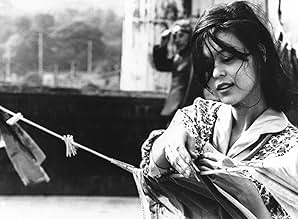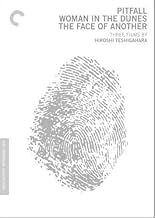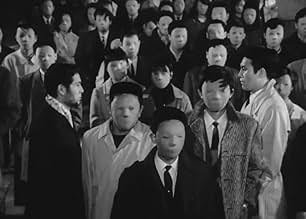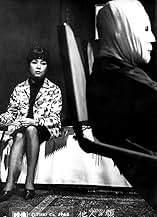ÉVALUATION IMDb
7,9/10
11 k
MA NOTE
Ajouter une intrigue dans votre langueA businessman with a disfigured face obtains a lifelike mask from his doctor, but the mask starts altering his personality.A businessman with a disfigured face obtains a lifelike mask from his doctor, but the mask starts altering his personality.A businessman with a disfigured face obtains a lifelike mask from his doctor, but the mask starts altering his personality.
- Prix
- 2 victoires au total
Robert Dunham
- Foreign man in Bar
- (uncredited)
Histoire
Le saviez-vous
- AnecdotesDirector Hiroshi Teshigahara said that he intended the film to explore both personal and cultural identities. While the examination of personal identity is quite overt, Teshigahara also explored how Japan's cultural identity had been impacted by World War II and its aftermath.
- Citations
Psychiatrist: You're not the only lonely man. Being free always involves being lonely. Just there is a mask you can peel off and another you can not.
- ConnexionsReferenced in Bara no sôretsu (1969)
Commentaire en vedette
I loved the premise, appreciated the philosophy, and enjoyed some of the avant-garde bits of filmmaking here, but I don't think this film quite lived up to its full potential, and it didn't fully connect with me.
From the start, there are existential themes of isolation and absurdity, and the man's condition reminded me of Gregor Samsa waking up and discovering he was a giant bug. With his face heavily bandaged, he's alienated from everyone around him, including his wife, who shrinks from his touch. The film explores identity, acceptance, and whether the mask or persona we adopt liberates or controls us. The minor parallel story of the young woman with the scar on her face also deals with a mask of sorts, and isolation.
Existentialism was common after WWII, and perhaps heightened in Japan by its having lost the war, and gone through more dramatic changes politically and psychologically. Maybe the young woman in the minor story, with burns apparently suffered in childhood at Nagasaki, is a symbol for the country's scars, and its identity fundamentally changing. Similarly, maybe the man losing his face from an accident at work is a symbol for the modern or corporate world changing us, as we work as cogs in a machine.
I loved to think about those things, but the film doesn't expand on them as profoundly as it could have. Instead of a character arc that shows some form of change in the man over time, it gives us mostly dialogue which doesn't land as philosophically as I think it was intended, and commits the sin of telling us instead of showing us in the process. The doctor gives us dire warnings about far more changes than we actually see. Having the man's primary focus be to seduce his wife while disguised in his new mask was unimaginative and uninspired, though I did like thinking about the irony of this being the opposite of love, which should involve an unmasking and getting to one another's 'true self.' There are also banal bits like women putting on make-up being yet another form of mask. As for the parallel story, with the incest, rising sun, and oblivion, I think there is symbolism and some level of desperation or despair here, but it's not strong, and narratively it probably should have been at least loosely integrated with the main story.
Overall though, the film is well worth seeing. The production value is high, with that ultra-cool doctor's office, and the assortment of creative visual tricks director Hiroshi Teshigahara gives us, including freeze frames and surreal imagery. The striking scene in the crowd towards the end is also fantastic, and the film's best. My favorite line to ponder was this one: "I wonder if we see the true face of a gem when it's polished, or in the rough."
From the start, there are existential themes of isolation and absurdity, and the man's condition reminded me of Gregor Samsa waking up and discovering he was a giant bug. With his face heavily bandaged, he's alienated from everyone around him, including his wife, who shrinks from his touch. The film explores identity, acceptance, and whether the mask or persona we adopt liberates or controls us. The minor parallel story of the young woman with the scar on her face also deals with a mask of sorts, and isolation.
Existentialism was common after WWII, and perhaps heightened in Japan by its having lost the war, and gone through more dramatic changes politically and psychologically. Maybe the young woman in the minor story, with burns apparently suffered in childhood at Nagasaki, is a symbol for the country's scars, and its identity fundamentally changing. Similarly, maybe the man losing his face from an accident at work is a symbol for the modern or corporate world changing us, as we work as cogs in a machine.
I loved to think about those things, but the film doesn't expand on them as profoundly as it could have. Instead of a character arc that shows some form of change in the man over time, it gives us mostly dialogue which doesn't land as philosophically as I think it was intended, and commits the sin of telling us instead of showing us in the process. The doctor gives us dire warnings about far more changes than we actually see. Having the man's primary focus be to seduce his wife while disguised in his new mask was unimaginative and uninspired, though I did like thinking about the irony of this being the opposite of love, which should involve an unmasking and getting to one another's 'true self.' There are also banal bits like women putting on make-up being yet another form of mask. As for the parallel story, with the incest, rising sun, and oblivion, I think there is symbolism and some level of desperation or despair here, but it's not strong, and narratively it probably should have been at least loosely integrated with the main story.
Overall though, the film is well worth seeing. The production value is high, with that ultra-cool doctor's office, and the assortment of creative visual tricks director Hiroshi Teshigahara gives us, including freeze frames and surreal imagery. The striking scene in the crowd towards the end is also fantastic, and the film's best. My favorite line to ponder was this one: "I wonder if we see the true face of a gem when it's polished, or in the rough."
- gbill-74877
- 30 juin 2019
- Lien permanent
Meilleurs choix
Connectez-vous pour évaluer et surveiller les recommandations personnalisées
- How long is The Face of Another?Propulsé par Alexa
Détails
Box-office
- Brut – à l'échelle mondiale
- 35 185 $ US
- Durée2 heures 2 minutes
- Couleur
- Mixage
- Rapport de forme
- 1.33 : 1
Contribuer à cette page
Suggérer une modification ou ajouter du contenu manquant



































